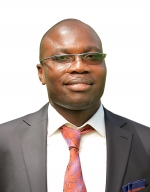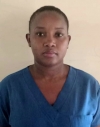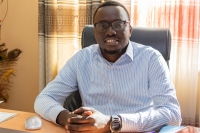Frederick Oporia
ID:
|
Improving use of seaworthy life jackets among boaters on Lake Albert, Uganda. A cluster randomized trial
REFNo: SS992ES
1. To estimate the prevalence of life jacket use among boaters on Lake Albert.
2. To identify the determinants of life jacket use among boaters on Lake Albert
3. To determine the seaworthiness of life jackets used by boaters on Lake Albert
4. To design a behavior change intervention aimed at improving use of seaworthy life jackets among boaters on Lake Albert
5. To pilot and evaluate the effectiveness of a behavior change intervention on improving use of seaworthy life jackets among boaters on Lake Albert
|
Uganda |
2021-09-10 |
2024-09-10 |
Social Science and Humanities |
|
Degree Award |

|
Carolyn Pelnik
ID:
|
Identifying and Easing Constraints on Microenterprise Location within Kampala, Uganda
REFNo: SS935ES
This project asks whether business relocation within the city could increase profits for microfirms in Kampala, Uganda, and if so, then what frictions (constraints) restrict a firm’s ability to relocate without intervention. Ultimately, this project plans to use a multi-arm randomized experiment to accomplish 3 aims: to detect appetite for business relocation, whether relocation increases profits, and which of the tested frictions might constrain location choice. In the first phase of the research, the project will survey microfirms in Kampala to understand their current locations, how profits vary by location across the city, what aspirations the business owners have with respect to future business growth, and what challenges they perceive to accomplishing business growth.
|
USA |
2021-09-10 |
2024-09-10 |
Social Science and Humanities |
Non-Clinical Trial |
Non-degree Award |

|
Paineto Masengere
ID: UNCST-2021-R013195
|
Perceptions, barriers, and facilitators of adoption of healthy lifestyles for cardiovascular disease prevention among slum communities in Kampala, Uganda
REFNo: HS1661ES
1. To explore how slum dwellers in Kampala district define a healthy lifestyle in the context of cardiovascular disease prevention.
2. To explore the barriers and facilitators to adopting recommended lifestyles for cardiovascular disease prevention among slum dwellers.
3. To explore the potential roles of community actors in slums in cardiovascular disease prevention.
|
Uganda |
2021-09-10 |
2024-09-10 |
Medical and Health Sciences |
Non-Clinical Trial |
Non-degree Award |

|
Felix Oyania
ID: UNCST-2021-R013492
|
Feasibility of Primary Repair for Anorectal Malformations in Uganda
REFNo: HS1632ES
To determine the feasibility of primary repair for anorectal malformations in Uganda.,
|
Uganda |
2021-09-10 |
2024-09-10 |
Medical and Health Sciences |
Non-Clinical Trial |
Degree Award |

|
FRANK MULINDWA
ID:
|
Changes in insulin kinetics after withholding dolutegravir in Ugandan HIV patients who develop diabetes while on dolutegravir.
REFNo: HS1493ES
To determine changes in; insulin secretion, insulin sensitivity, insulin clearance and HBA1C at 24 weeks after DTG discontinuation in Ugandan HIV patients who develop diabetes while on DTG.
|
Uganda |
2021-09-09 |
2024-09-09 |
Medical and Health Sciences |
Non-Clinical Trial |
Non-degree Award |
.jpg)
|
Martha Musyoka Mbenia
ID:
|
PREDICTORS OF ADVERSE FETO-MATERNAL OUTCOMES AMONG MOTHERS ADMITTED WITH ANTEPARTUM HEMORRHAGE AT MBARARA REGIONAL REFERRAL HOSPITAL
REFNo: HS1450ES
To describe adverse outcomes and determine predictors of adverse feto-maternal outcomes in mothers with antepartum hemorrhage at Mbarara Regional Referral Hospital
|
Kenya |
2021-09-09 |
2024-09-09 |
Medical and Health Sciences |
Clinical Trial |
Degree Award |

|
Jimmyy Opee
ID:
|
PROPORTION AND FACTORS ASSOCIATED WITH INTRA-PROCEDURAL PAIN AMONG WOMEN UNDERGOING MANUAL VACUUM ASPIRATION FOR INCOMPLETE ABORTION AT MBARARA REGIONAL REFERRAL HOSPITAL
REFNo: HS1462ES
General objective
To determine the proportion and factors associated with intra-procedural pain among women undergoing Manual Vacuum Aspiration for incomplete abortion at gynecology ward at Mbarara Regional Referral Hospital.
Specific objectives
1. To determine the proportion of women with intra-procedural pain undergoing Manual Vacuum Aspiration for incomplete abortion at gynecology ward at Mbarara Regional Referral Hospital.
2. To determine the factors associated with intra-procedural pain among women undergoing Manual Vacuum Aspiration for incomplete abortion at gynecology ward at Mbarara Regional Referral Hospital.
|
Uganda |
2021-09-09 |
2024-09-09 |
Medical and Health Sciences |
Non-Clinical Trial |
Degree Award |

|
Ronald Mulebeke
ID:
|
A pilot study to assess the impact of Supportive Supervision and Behavior Change Communication at private health facilities in Uganda
REFNo: HS1588ES
This study will assess the impact of supportive supervision and behaviour change communication to improve the quality of malaria care and data management delivered by clinicians at private health facilities in Uganda.
|
Uganda |
2021-09-09 |
2024-09-09 |
Medical and Health Sciences |
Non-Clinical Trial |
Non-degree Award |

|
ANTHONY KAYIIRA
ID: UNCST-2020-R014108
|
Understanding Reproductive Health among Survivors of Paediatric and Young adults (URHSPY) Cancers: a mixed method study
REFNo: HS1652ES
To explore the knowledge, perceptions, and attitude of; parents or caretakers of children with cancer, and health workers on cancer treatment-related reproductive morbidity, at the Uganda Cancer Institute,To describe self-reported reproductive morbidity associated with cancer treatment among childhood and young-adult cancer survivors.,To establish the extent of reproductive morbidity associated with cancer treatment among young cancer survivors in Uganda. In addition, we aim to explore the contextual enablers and barriers to addressing cancer treatment-related reproductive morbidity in Uganda.,
|
Uganda |
2021-09-09 |
2024-09-09 |
Medical and Health Sciences |
Non-Clinical Trial |
Non-degree Award |

|
Susan Nabadda
ID: UNCST-2020-R014331
|
Study Protocol for the Evaluation of Covid 19 Antibody and Antigen Rapid Diagnostic Test (RDT) In the EAC Partner States
REFNo: HS1591ES
Evaluation of ELISA cross-reactivity on stored archived negative samples between East African Partner States. ,Evaluation RDT performance differences between the East African Partner States,- Evaluate the clinical specificity of antibody RDT and ELISA using serum/plasma specimens from COVID-19 negative specimens from pre-COVID-19 (archived stored samples),- Evaluation of COVID19 antibody RDTs and ELISA’s in the East African region, using serum/plasma samples from COVID-19 confirmed based on RT-PCR results (RT-PCR positive test results). ,Evaluation of COVID19 antigen RDTs against gold standard PCR in the East African region,
|
Uganda |
2021-09-09 |
2024-09-09 |
Medical and Health Sciences |
Non-Clinical Trial |
Non-degree Award |

|
Susan Nabadda
ID: UNCST-2020-R014331
|
Evaluation of TUBEX Typhoid TF IgM Antibody test for Early Diagnosis of Typhoid fever Among patients in Uganda
REFNo: HS1548ES
1) To carry out blood culture testing on all samples from patients with signs and symptoms of typhoid fever in the selected facilities of Uganda.
2) To carry out serological testing for Salmonella antibodies using the TUBEX Typhoid TF IgM Antibody test on the serum samples of consented/assented patients whose samples grew Salmonella Typhi.
|
Uganda |
2021-09-09 |
2024-09-09 |
Medical and Health Sciences |
Non-Clinical Trial |
Non-degree Award |

|
Fred Nalugoda
ID: UNCST-2021-R013343
|
Exploring the impact of out-migration on remaining partners’ HIV and sexual behavior perceptions and practices in Rakai, Uganda: a qualitative study.
REFNo: SS981ES
The overall aim of this study is to qualitatively explore the impact of out-migration amongst heterosexual couples on non-migrating partners’ HIV and sexual behavior perceptions and practices in Rakai, Uganda.
|
Uganda |
2021-09-09 |
2024-09-09 |
Social Science and Humanities |
Non-Clinical Trial |
Non-degree Award |

|
Jafesi Pulle
ID: UNCST-2020-R014213
|
TRUST IN MEDICAL RESEARCH AMONG PATIENTS AT A REGIONAL REFERRAL HOSPITAL AND COMMUNITY MEMBERS IN LIRA DISTRICT, NORTHERN UGANDA
REFNo: HS1685ES
Explore community perceptions of trust in medical research,2. Determine the other factors associated with trust of medical research,1. Compare level of trust for medical research among community members and persons that are hospitalized.,To compare the level of trust in medical research among people hospitalized at a hospital and the community members, identify associated factors and explore prevailing community perceptions of trust in medical research.,
|
Uganda |
2021-09-09 |
2024-09-09 |
Medical and Health Sciences |
Non-Clinical Trial |
Degree Award |

|
Daniel Mongovin David Thomas
ID:
|
Dry Rifting in the Albertine-Rhino Graben (DRIAR)
REFNo: NS160ES
To conduct a geological investigation of faulting associated with continental rifting in the magma-poor rift environment in the northernmost Western Branch of the East African Rift System.
|
USA |
2021-09-08 |
2024-09-08 |
Natural Sciences |
Non-Clinical Trial |
Degree Award |

|
Julian Bagyendera Kobutungi
ID:
|
Gender, Youth and Social Inclusion Baseline Assessment for the USAID Local Partner Health Services – Ankole (USAID LPS – Ankole)
REFNo: SS1002ES
The main objective is to conduct a mixed method gender and youth social inclusion assessment which includes a literature review; collection of primary quantitative and qualitative data.,
|
Uganda |
2021-09-08 |
2024-09-08 |
Social Science and Humanities |
Non-Clinical Trial |
Non-degree Award |

|
Nixon Niyonzima
ID: UNCST-2020-R014577
|
UNDERSTANDING PATHOGENESIS OF BURKITT LYMPHOMA TO DEVELOP BETTER TREATMENTS FOR AFRICAN ENDEMIC BURKITT LYMPHOMA
REFNo: HS1546ES
4. To establish a BL tumor biorepository at the Uganda Cancer Institute ,3. To generate PDX mouse models of BL to understand the molecular factors that govern response to COM therapy in children with endemic BL at the Uganda Cancer Institute. ,2. To describe the molecular differences between endemic BL and sporadic BL. ,1. To determine the molecular profile of endemic BL tumors at the Uganda Cancer Institute,
|
Uganda |
2021-09-08 |
2024-09-08 |
Medical and Health Sciences |
Non-Clinical Trial |
Non-degree Award |

|
Isaac Ssewanyana
ID: UNCST-2020-R014336
|
PERFORMANCE EVALUATION OF COVID-19 ANTIGEN RAPID DIAGNOSTIC TESTS
REFNo: HS1690ES
To determine the association of positive index test results with disease stage (days since symptom onset, e.g. acute, early, late), symptom severity and symptom severity.,To determine the diagnostic accuracy of SARS-CoV-2 Ag RDTs on a respiratory specimen (NP swab, OP swab, nasal swab, saliva), vs Cobas SARS-CoV-2 assay as performed in patients presenting with influenza-like illness.,
|
Uganda |
2021-09-08 |
2024-09-08 |
Medical and Health Sciences |
Clinical Trial |
Non-degree Award |

|
Pontiano Kaleebu
ID: UNCST-2021-R013577
|
A clinical trial to assess the safety and immunogenicity of LNP-nCOV saRNA-02, a self-amplifying ribonucleic acid (saRNA) vaccine encoding the S glycoprotein of SARS-CoV-2, the causative agent of COVID-19, in SARS-CoV-2 seronegative and seropositive Uganda population
REFNo: HS1641ES
Primary Objective:
• To compare the safety and immune responses for SARS-CoV-2 seronegative and seropositive individuals from two immunisations with LNP-nCOV saRNA-02 administered IM 4 weeks apart at one dose level in 42 participants age 18-45 years.
Exploratory Objectives:
• To characterise the humoral and cellular immune responses to LNP-nCOV saRNA-02 administered at one dose given at 0 weeks and 4 weeks for individuals seronegative and seropositive for SARS-CoV-2 antibodies
• To characterise the profile of class and sub-class of antibody responses
• To characterize infection induced immune responses in participants with naturally acquired infection who are also exposed to the vaccine
|
Uganda |
2021-09-08 |
2024-09-08 |
Medical and Health Sciences |
Clinical Trial |
Non-degree Award |

|
David Musoke
ID:
|
Collaboration between Biomedical and Traditional Mental Health Service Providers in Wakiso District, Uganda
REFNo: HS1581ES
To explore how biomedical service providers and traditional healers can work together to improve access to mental health care in Wakiso district, Uganda.
|
Uganda |
2021-09-08 |
2024-09-08 |
Medical and Health Sciences |
Non-Clinical Trial |
Non-degree Award |

|
Janet SEELEY
ID:
|
Examining ethical issues, stakeholder engagement and acceptability of biobanking in Sub-Sahara Africa
REFNo: HS1645ES
General Objectives:
To explore perceptions, informed opinion and experiences of key stakeholders on approaches and value of community engagement in biobanking in LMIC; and if and how community approval should be obtained.
Specific Objectives:
1. To explore key stakeholders’ perceptions, informed opinions and underlying values around potential benefits of biobanks in SSA and important aspects of operationalising a biobank in LMICs.
2. To describe approaches that could be used to engage communities and stakeholders about biobanking.
3. To examine governance systems and structures that should be in place for a biobank to become operational, and ways in which community voices might be included in those systems
4. To determine initial key elements required to assume a community social license based on outputs of 1-3
|
UK |
2021-09-08 |
2024-09-08 |
Medical and Health Sciences |
Non-Clinical Trial |
Non-degree Award |

|
| View |
|
Sort By: |
|
|
|
| |
|